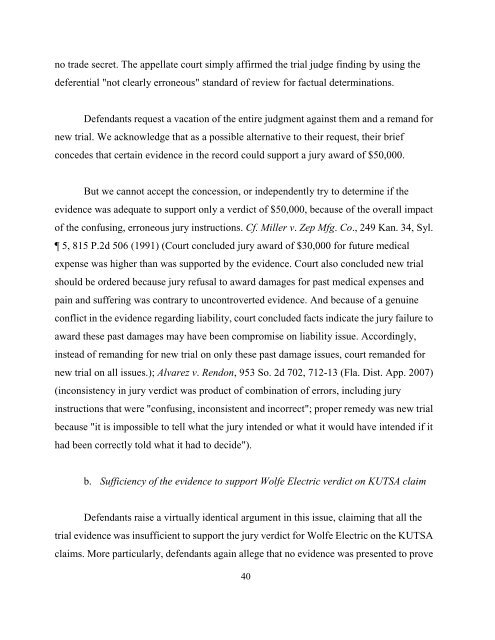Kansas Supreme Court - 99536 â Wolfe Electric, Inc. v. Duckworth
Kansas Supreme Court - 99536 â Wolfe Electric, Inc. v. Duckworth
Kansas Supreme Court - 99536 â Wolfe Electric, Inc. v. Duckworth
You also want an ePaper? Increase the reach of your titles
YUMPU automatically turns print PDFs into web optimized ePapers that Google loves.
no trade secret. The appellate court simply affirmed the trial judge finding by using the<br />
deferential "not clearly erroneous" standard of review for factual determinations.<br />
Defendants request a vacation of the entire judgment against them and a remand for<br />
new trial. We acknowledge that as a possible alternative to their request, their brief<br />
concedes that certain evidence in the record could support a jury award of $50,000.<br />
But we cannot accept the concession, or independently try to determine if the<br />
evidence was adequate to support only a verdict of $50,000, because of the overall impact<br />
of the confusing, erroneous jury instructions. Cf. Miller v. Zep Mfg. Co., 249 Kan. 34, Syl.<br />
5, 815 P.2d 506 (1991) (<strong>Court</strong> concluded jury award of $30,000 for future medical<br />
expense was higher than was supported by the evidence. <strong>Court</strong> also concluded new trial<br />
should be ordered because jury refusal to award damages for past medical expenses and<br />
pain and suffering was contrary to uncontroverted evidence. And because of a genuine<br />
conflict in the evidence regarding liability, court concluded facts indicate the jury failure to<br />
award these past damages may have been compromise on liability issue. Accordingly,<br />
instead of remanding for new trial on only these past damage issues, court remanded for<br />
new trial on all issues.); Alvarez v. Rendon, 953 So. 2d 702, 712-13 (Fla. Dist. App. 2007)<br />
(inconsistency in jury verdict was product of combination of errors, including jury<br />
instructions that were "confusing, inconsistent and incorrect"; proper remedy was new trial<br />
because "it is impossible to tell what the jury intended or what it would have intended if it<br />
had been correctly told what it had to decide").<br />
b. Sufficiency of the evidence to support <strong>Wolfe</strong> <strong>Electric</strong> verdict on KUTSA claim<br />
Defendants raise a virtually identical argument in this issue, claiming that all the<br />
trial evidence was insufficient to support the jury verdict for <strong>Wolfe</strong> <strong>Electric</strong> on the KUTSA<br />
claims. More particularly, defendants again allege that no evidence was presented to prove<br />
40
















